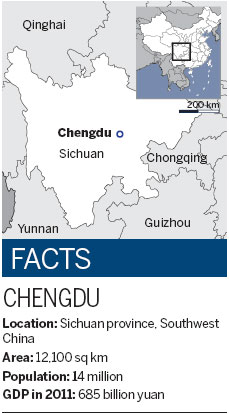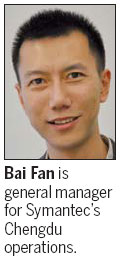Robust industrial climate, rich talent bring foreign companies in droves to Chengdu
The glitzy skyscrapers and bustling shopping districts in Beijing and Shanghai are no longer the only barometers of foreign direct investment in China. That baton has instead passed to the western regions of China, where cities with better infrastructure and an abundant talent pool are stealing a march over their bigger peers.
|
 A view of Tianfu Software Park in Chengdu, Sichuan province. [Photo/China Daily] |
The shifting paradigm is more than evident in the bustling Shuangliu International Airport in Chengdu where passengers and airplanes jostle for space, even as airport authorities contemplate adding more terminals, shops and runways to cater to the growing traffic.
The recently opened new terminal looks swankier with more luxury stores and other modern facilities designed to make the travel process smoother and faster.
|
 |
Scores of taxis and buses make the journey between the airport and city center easier and faster. Along the busy expressway that runs from the airport to downtown, one can spot service shops set up by big automobile companies, even as bustling shopping malls elsewhere in the city are full of customers. The glitzy five-star hotels set up by big international brands such as Kempinski and Intercontinental are looking to expand further to cater to the jetsetters.
The word Chengdu has often proved to be a tough nut to crack for those who are not too comfortable with speaking Chinese - so much so that Chengdu often ends up being pronounced as "can do". But that is exactly the attitude the city has adopted in the past few years.
The busy airport and burgeoning passenger numbers are not Chengdu's only boast. It was already well known as the birthplace of pandas and a major culinary destination.
Chengdu, the fourth-busiest airport in China in terms of passenger numbers after Beijing, Guangzhou and Shanghai, is also a major logistics hub and a destination of choice for global financial services firms and manufacturing giants.
But it is the steadily increasing foreign direct investment from multinational companies that has propelled the lesser-known Chinese city into the big league. It is currently the only inland Chinese city that appears in the 2011 and 2012 "Annual Top 10 Best Foreign Investment Strategy Cities in Asia and the Pacific Region" list published by FDI-a magazine published by the UK-based Financial Times.
Next year the city will host the prestigious Global Fortune Forum, which will see several Fortune 500 firms and their top brass, along with heads of state and industry leaders, flocking to the city.
Industry experts aver that Chengdu's success can be best summed up in three words - "China's New Future".
The cumulative investment made by 215 Fortune 500 Global enterprises in Chengdu during the first six months of the year was 50 billion yuan ($8 billion; 6.27 billion euros), 28.7 billion yuan more than the same period last year.
Cold beginnings
 |
In 2007, when Bai Fan first arrived in Chengdu, things were not as hunky-dory as they are now. Alighting on a cold and blistery night at the Shuangliu airport, Fan found himself staring at empty aisles, deserted parking lots and hardly any taxis or buses. There were no foreign faces around, nor were there any signs of expatriate communities.
His shock was exemplified by an international school standing out like a sore thumb while checking out a large area of empty farmland as the prospective China office site for global software security firm Symantec. No one at the company headquarters in California had ever heard of Chengdu till then.
Over the next five years, Bai and his team toiled hard to be an integral part of the Chengdu High-tech Industrial Development Zone. All the office buildings conform to US standards and boast exceptional designs. Symantec has also set up a Security Response Center in Chengdu to support its other centers in Tokyo, Dublin and Culver City of Los Angeles.
"When you compare these five years with the 30 years that it took for Symantec to evolve as a global company, it does not seem to be a long period," says Bai. "But we have made tremendous achievements in China during these five years, with Chengdu being the vital cog in that journey."
Bai, the general manager for Symantec's Chengdu operations, can, however, rest assured on one aspect. He is no longer the only man standing in Chengdu. Surrounding him at the Tianfu Software Park are other multinational corporations such as IBM, Cisco and Dell.
Though hesitant and wary at first, many of these multinationals have decided to set up shop in Chengdu after being convinced by the city's "can do" abilities.
